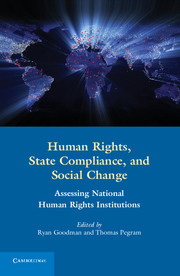Book contents
- Frontmatter
- Contents
- Contributors
- Preface
- 1 Introduction
- PART I NHRIs in Theory and Reality
- PART II NHRI Performance
- 5 National Human Rights Institutions and the International Human Rights System
- 6 National Human Rights Institutions in Anglophone Africa
- 7 National Human Rights Institutions in the Asia Pacific Region
- 8 National Human Rights Institutions in Central and Eastern Europe
- 9 National Human Rights Institutions in Latin America
- PART III NHRIs and Compliance
- PART IV Final Reflections
- Annex 1
- Index
- References
5 - National Human Rights Institutions and the International Human Rights System
from PART II - NHRI Performance
Published online by Cambridge University Press: 05 June 2012
- Frontmatter
- Contents
- Contributors
- Preface
- 1 Introduction
- PART I NHRIs in Theory and Reality
- PART II NHRI Performance
- 5 National Human Rights Institutions and the International Human Rights System
- 6 National Human Rights Institutions in Anglophone Africa
- 7 National Human Rights Institutions in the Asia Pacific Region
- 8 National Human Rights Institutions in Central and Eastern Europe
- 9 National Human Rights Institutions in Latin America
- PART III NHRIs and Compliance
- PART IV Final Reflections
- Annex 1
- Index
- References
Summary
Introduction
National human rights institutions (NHRIs or national institutions) and the international human rights system have a history of engagement but too often it has been one sided. Although national human rights institutions are the creations of their own domestic laws and processes, their existence is closely connected with the international human rights system that has nurtured and promoted them for many decades, especially since 1993. The international system now looks to the institutions to play significant roles through engagement with its mechanisms and processes. Yet, national institutions have often been slow to respond to this expectation and few make more than sporadic, ad hoc contributions. This chapter examines the relationship. It discusses the importance of international engagement by national institutions and describes the opportunities and procedures for engagement that are available if national institutions are prepared to use them. It argues that the international human rights system now needs their support and contribution and that it is in the interests of the institutions themselves to respond positively.
National Institutions Are Products of the International System
Although the first national institutions were established in the late 1970s and 1980s, their growth in numbers and strength can be traced directly to the strong endorsement they received from the Second World Conference on Human Rights in 1993:
The World Conference on Human Rights reaffirms the important and constructive role played by national institutions for the promotion and protection of human rights, in particular in their advisory capacity to the competent authorities, their role in remedying human rights violations, in the dissemination of human rights information, and education in human rights.
The World Conference on Human Rights encourages the establishment and strengthening of national institutions, having regard to the “Principles relating to the status of national institutions” and recognizing that it is the right of each State to choose the framework which is best suited to its particular needs at the national level.
- Type
- Chapter
- Information
- Human Rights, State Compliance, and Social ChangeAssessing National Human Rights Institutions, pp. 93 - 123Publisher: Cambridge University PressPrint publication year: 2011
References
- 2
- Cited by

